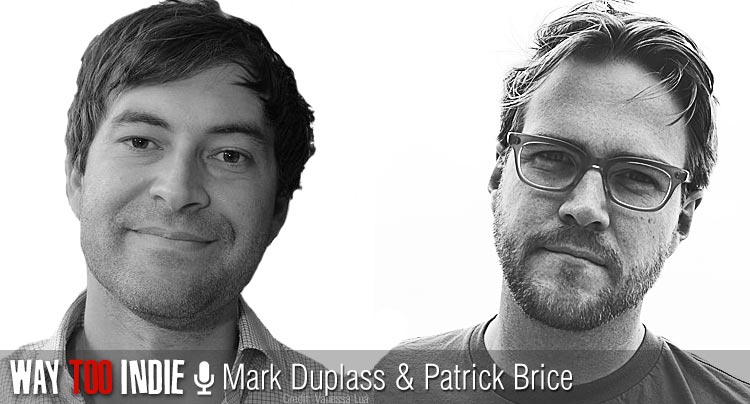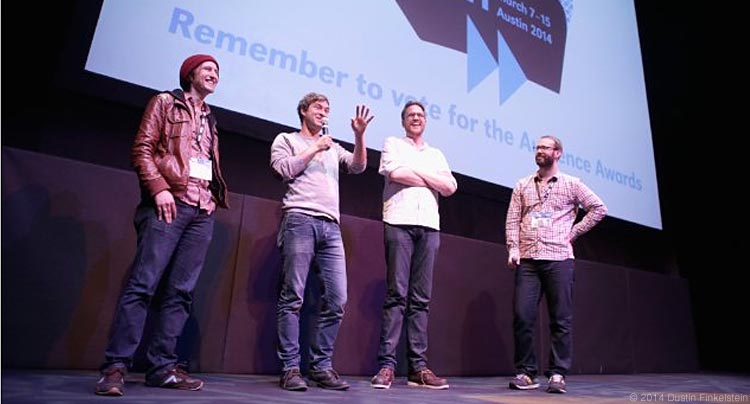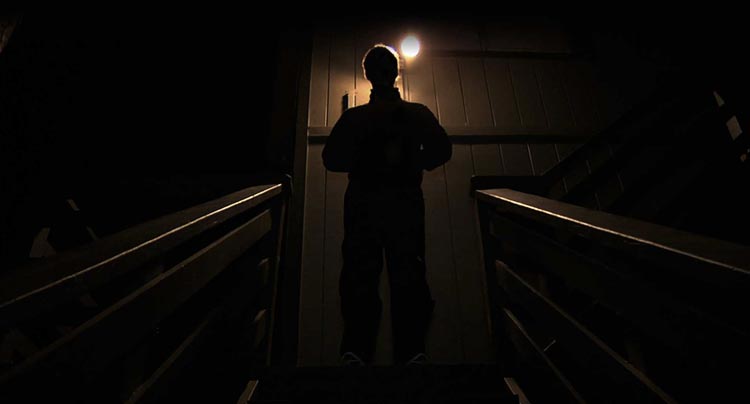Mark Duplass and Patrick Brice Talk About What Makes a Good Found Footage Movie

When a film has the name Mark Duplass attached to it, the film typically contains an in-depth look on human behavior with an empathic, yet slightly offbeat voice. Ergo, my interest is peaked whenever Duplass is involved with a project. In his latest role, he uncharacteristically plays the part of the anti-hero who generates screams as well as laughs in the comedy/horror/thriller film Creep.
After the world premiere of Creep at SXSW, I met up with director Patrick Brice and star Mark Duplass to talk about their latest film. In this panel interview, the two describe what makes a good found footage film, what they discovered while showing the film, and how the official still from the film was an accident.
How did you guys come up with the original idea?
Mark Duplass: It was a series of conversations, we’re close friends. We wanted to work together and we wanted to find something that we could perform in together. I think we are obsessed with how interesting people can be. We are people watchers. Most of our conversations gravitate towards these intricate details of human behavior and human interactions that we find funny or weird or interesting.
Once we came up with this idea of, you walk into someone’s home on a Craigslist encounter without knowing anything about them, it can lead to things that are maybe a little funny, maybe a little weird, and depending on which turn it takes, could get kind of fucking crazy. So we decided to explore that wormhole.
I remember seeing the first poster with Peachfuzz [as the title], when and why did you decide to change the title to Creep?
Duplass: Throughout the process, we showed the movie to a lot of people and discovered something really interesting. Which is that when you are making a movie that’s about very small human interactions, you want people’s brains focused on that. When we told people it was called Peachfuzz, they were trying to figure out for a while why it was called Peachfuzz. But when you tell people that the movie is called Creep, they know what they are going into, they know what they are looking for and their brain is focused solely on our faces. And the movie played intensely better.

Speaking of reactions, I found it particularly rewarding watching the film with an audience. Some would be laughing while others would be gasping. Did you expect to get such mixed reactions from the audience?
Patrick Brice: We anticipated it for sure. That’s been the reaction all the way through whenever we’ve shown this to friends. That was our primary hope. So last night was super validating.
Duplass: It’s a nice conversation piece. In particular, last night when we were walking out of theater there was a couple outside literally arguing with each other. Kind of angry with each other about one of them had laughed and the other had screamed in that moment. She was just like shocked that he could find it funny and he was shocked that had thought that it was scary. And I was like that is great, that’s a successful screening for us.
Mark, this isn’t your first comedy/horror type film that you’ve been apart of, was there anything you brought to Creep from making Baghead?
Duplass: This was a very unique film in that we [had] a pretty small crew and we shot a lot of the film off of an outline. Then we would edit, show it to people, then we would come back and reshoot. We shot this movie over the course of a year and a half. I have never done a movie like that before, so we were definitely in uncharted territory.
In terms of the tonal complexity of it, we started the movie off as an odd Craigslist encounter and wanted to see where it would go. The footage and the nature of the movie was begging us to go in the realm of something more thriller or horror oriented. We couldn’t stop it.
Brice: And it was a chance for you to explore the darkness a little bit.
Duplass: Yeah. I haven’t done that as much so it was fun.
With such a loose script organic shooting process, were there any major happy accidents that happened?
Duplass: [thinks about it a moment] Patrick was very thoughtful about where the cameras should be at all times and how to justify it. So in terms of the blocking of things, that stuff was pretty tightly executed.
That being said, there was some set pieces that we stumbled upon that we were like ‘Oh, this is very, very cool. We should shoot it this way.’ I think there was a moment where I play a little bit in silhouette, that we didn’t like…
Brice: The still from the film.
Yeah, the one where he is at the top of the staircase with the light.
Brice: Yeah, Mark is literally walking up the stairs and…
Duplass: Patrick is like, “Don’t move! Get back in here and we’re going to redo it.” [laughs] Every now and then you get some things [like that].

From start to finish it seems like you guys had a lot of fun with the project, but were there any sections or particular scenes that were especially difficult?
Duplass: There was stuff that we had to dial in [to make sure that] while this is a “POV” or “found footage” movie, that we could make [it] creditable. So we wanted to make sure that we kept our eyes and attention [to that]. Patrick did a real good job of make sure it was justified why we were seeing it from this perspective. We had to always think about that. It’s not always the most fun thing. That’s homework.
You worked with Jason Blum on this project, how involved was he?
Duplass: We made this film and then brought it to Jason. We knew that the partnership between what we do, which is more relationship oriented, and what he does, which is more horror oriented, would be something cool. To be quite honest, we love the idea that even the nature of the partnership of the Duplass Brothers and Blumhouse, asks the question, how the fuck is that going to work? [laughs] That to us is the exact question we want people asking when they walk in the theatre.
Yeah. Seemed like there was a lot of attention brought to when to insert certain jump scares at certain intervals. Was that something that you borrowed from them?
Brice: Oh, for sure.
Duplass: Yeah. We thought about it through the way and we wanted this movie to be odd and unique and interesting. But [we] also want horror fans to know that [they] can come see this and you’ll see something different, but we’ll also give you what you are looking for.
You’ve stated before that you are both not big fans of the found footage genre, what is it that you don’t care for and how did you go about addressing it in Creep?
Duplass: That’s tricky. Our feeling is that a lot of people go to make found footage because they feel like it’s an easy way to make a movie and a cheap way to make a movie. So most of the things we don’t like are the people who are just trying to make a found footage movie [for that reason]. Usually their story has a lot of holes in it and the performances are not what they could be because they are approaching it from the wrong reasons. Those are the things we don’t like–an overused and overexploited genre.
So what we feel like we have to offer is that we’re relationship people. We make sensitive movies. So we thought we could at least get the story right and get the performances right. Then we almost backed into it being a horror movie because the nature of it got really, really strange when we got to shooting.
So it wasn’t like you wanted to do a found footage film and then built something off of that.
Brice: Right. We started with the characters and getting you to care about them. Then hopefully the viewer is going to forget they are watching a found footage film.
Yeah. I certainly did at times.
Duplass: Yeah. There is nothing inherently wrong with the form. It’s just a form. It’s just how you use it.
There are really good ones. But for every good one there is about a hundred bad ones.
[everyone laughs]
Duplass: A hundred thousand! [laughs]
So you guys cited that your editor [Chris Donlon] was a big part of the process, could you explain the importance of him?
Duplass: He was the third filmmaker really. He was with us every step of the way and one of Patrick’s oldest friends. We are all very close. He not only edited the whole film and helped us produce it, and it’s hard to explain, but Patrick and I are verbal and vocal and we move quickly, and Chris is quiet and sweet.
If you examine 4 hours in a process, 3 hours and 57 minutes of that are Patrick and I talking, and then the 3 minutes of that are Chris being quiet and asking, “What if you do this?”
Brice: [laughs]
Duplass: And then we are like, “Yes! We got it!”
